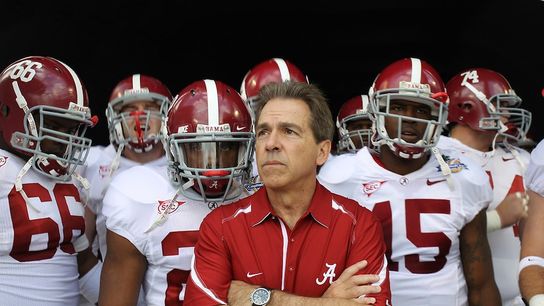When Jim Harbaugh unveiled plans to barnstorm through the south last summer in a series of strategically located satellite camps, the SEC issued a not-so-veiled threat that if the NCAA didn't nationalize the SEC's rule banning off-campus camps, the conference would lift its own rule and get involved themselves.
If it was a threat to get Michigan, Ohio State (which held a camp in south Florida in conjunction with Florida Atlantic last year), Penn State (which camped in Atlanta last year) and the like scurrying back to their northern climes, it didn't work. Michigan, as we know, doubled down, holding a portion of spring practice at IMG Academy in Florida, with satellite camps in Georgia, Mississippi and Texas to follow in the coming months.
So now it's time for Greg Sankey and company to follow through on their threat or lose this particular game of Chicken.
The SEC confirmed to Barrett Sallee of Bleacher Report late last week it has forwarded legislation banning guest coaching at off-campus camps, which could come to a vote next week. If the measure fails, the SEC said it plans to allow its own satellite camp prohibition rule, prohibiting coaches from coaching at camps more than 50 miles from their own campus, to expire on May 29, allowing all 14 programs to hit the road this summer.
"[The coaches] talked very specifically about their intent to canvas the nation if we're in the same circumstance next year," Sankey said last summer.
From my view: let them have at it. The SEC dubbed satellite camps "recruiting camps" last year, as if a changing in branding would somehow clue the nation into Harbaugh's nefarious intentions. Except his intentions are only nefarious to SEC coaches.
Satellite camps allow more players to be seen by more coaches while spending less of their own money. There are no victims here -- unless you count coaching staffs who can't overcome a single day of camp and allow a prospect to get out of their own back yard.
For all the chest-puffing the SEC did last year -- "There will be 14 jets in the air," an unnamed SEC coach told CBS's Dennis Dodd last year -- this won't change the way college football recruiting is conducted. After all, there's a reason the Big Ten is clawing at the SEC's recruiting territory -- that's where all the players are.
If the SEC were to be let off its leash -- and let it be known only the ACC joins the SEC in its ban on satellite camps -- ask yourself what's more likely: Hugh Freeze adding a handful of camps in Georgia, Florida and Texas, or Les Miles canvassing the Pacific Northwest just because he can?
There are only so many weeks in the college football off-season and most of them are filled already, leaving a limited time SEC coaches could add new camps in the first place. Unless, that is, a head coach wants to completely erase his staff's summer vacation time. And, let's be honest, that's part of the reason the SEC wants this ban in the first place. If Alabama is on the road eight weeks this summer, Gus Malzahn may have problems if his staff isn't on the road nine.
"I don't want to wear our assistant coaches out any more. I think there needs to be some sanity to our lives and to our schedules," then-Georgia head coach Mark Richt said last year.
"But if we're allowed to do it, we'll figure out a way to manage it."
And that's what this all boils down to -- a moderate change, as opposed to the SEC becoming even more SEC-like than ever.
As I've written since the issue first bubbled last year, more options for more players is a good thing. Here's hoping the ban fails and the SEC and ACC join the Big Ten, Big 12 and Pac-12 on the road this summer.
